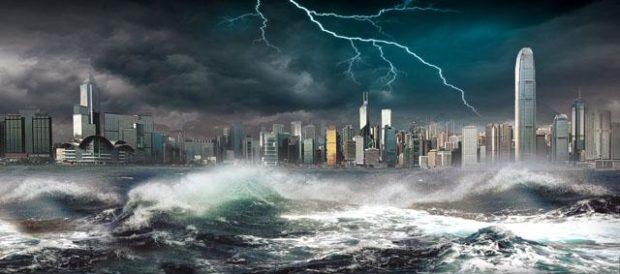A perfect storm
(Next Magazine, 2015/9/10, A004, Second Opinion, Bill Stacey)
A perfect storm
There is every chance that Hong Kong’s economy is headed towards a perfect storm, where policies that might once have seemed sensible and affordable, can become a crushing burden.
Think about the cumulative economic challenges. We have a symbiotic relationship with China. Its economy is undergoing a great deal of structural changes that are bound to have an impact on us. At the same time, China has started the process to loosen Renminbi’s link with the US dollar. As a result, the RMB has corrected and could fluctuate in a wider range than it used to.
At the same time, the US dollar, which the Hong Kong dollar is pegged to, has strengthened (by 8% against other Asian currencies in the past year and 14% against Euro and Yen), thus diminishing our attractiveness as a shopping haven.
This has already hit our retail sales and tourism arrivals. Demand for property from RMB based investors cannot be immune. In contrast, property markets of Australia and Canada with their weak currencies have been booming on China demand. At the higher end of our property market, prices have moderated while the pace of sales slows, suggesting a softening market.
Add to these woes a feeble global economy, shockingly slow growth in global trade, high leverage in much of the world, the imminent increase in US interest rates, and we have the necessary ingredients of a perfect storm. As it looms, the efficacy of quantitative easing and fiscal stimulus is increasingly being questioned, rendering policy makers little ammunition to deal with a recession should it rear its head.
We are a small open economy. We can only take the regional and global hand that we are dealt. No one should think that changing the linked exchange rate would be an answer. Since monetary disruption is at the core of many global problems, adding to that our own local dose of uncertainty would be unwise. Moreover, the stability of our now “strong” currency should help attract flight capital to come here.
As this storm approaches, all that we can do is to adapt. Yet recently introduced public policies are hampering our “automatic adjustment mechanism”, made famous by Sir Philip Haddon-Cave, to do precisely that. For instance, just as our economy slows, the minimum wage has gone up by 8% and is now 16% higher than it was when introduced. Meanwhile, the competition law is about to take full effect. The bureaucrats imported to enforce the new law will surely want to make an impact, if anything, to justify their existence. Such cynical exercise of power can have a chilling effect on an economy as it heads south.Even more worrying are the macro-prudential measures imposed to curb speculation in the property market. They have brought transactions in the second-hand market to a dribble, thus depriving a big segment of our economy the ability to adjust. More policy threats are looming on the horizon. Maximum working hours, which are being hotly debated, could significantly raise labor cost for many businesses. A much clamored for universal pension scheme could lock our budget into a permanently weaker position.
The linked exchange rate and our open economy have been essential to our prosperity. However, the price of this prosperity is that we must keep our budget in order while giving the “automatic adjustment mechanism” a free rein. The alternative of increased intervention is a poorer Hong Kong. Past administrations, before and after the handover, have understood this well. In the face of the Asian financial crisis, we adapted well and emerged more competitive, aided significantly by abolishing estate duties, and by becoming more closely integrated with China. The global financial crisis also saw measured responses and open markets that increased our importance as a financial center and as a vital link between China and global markets.We should all fear the impact of well-meaning calls for a more proactive government that risks changing direction at precisely the wrong time when looming economic stress might make those siren songs a more compelling call that will cast our ship onto the rocks.
Bill Stacey

